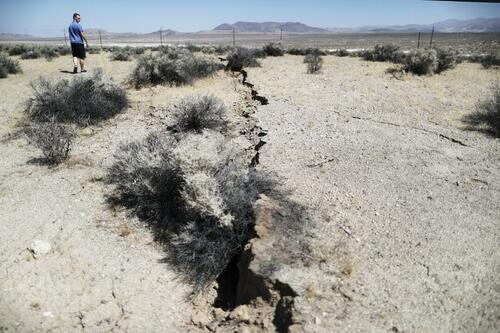
Authored by Travis Gillmore via The Epoch Times,
Californians will pay more for earthquake coverage in 2025, as the California Earthquake Authority - a not-for-profit organization funded by insurance companies and managed by the state - is raising rates by an average of 6.8 percent in January.
“[The earthquake authority] is committed to making earthquake insurance as available, reliable, and affordable as possible,” the organization said on its website.
“While we work hard to keep rates affordable, state law requires our rates to be actuarially sound.”
Policies are sold through 20 member companies affiliated with the earthquake authority, and those seeking earthquake insurance must have a homeowner or renter policy with the company that offers the additional coverage.
Cited as reasons for the spike are inflation, higher construction costs, and the price of reinsurance—coverage that insurers purchase to help pay claims.
Annual rates are expected to increase by less than $10 for renters and about $70 for homeowners, but some policyholders will see higher or lower adjustments.
The changes also include a new $500 sub-limit for broken personal property—including glassware, pottery, and certain other items—at no additional cost.
Standard homeowners, renters, and condominium insurance policies do not cover damage caused by earthquakes, though they will typically cover fire damage caused by temblors.
Mortgage lenders generally do not require earthquake coverage, though most mandate homeowner policies to cover other damage.
The Golden State accounts for about 90 percent of earthquakes nationwide, and about 10 percent of Californians carry insurance to cover damage, according to the Federal Emergency Management Agency.
Some homeowners and renters avoid earthquake insurance because of policy dynamics, as most homes would not experience damage that costs more than insurance deductibles. This leaves them paying for premiums without receiving aid in the event of a disaster, according to the agency.
Approximately one million Californians have policies with the earthquake authority, representing a fraction of the state’s homeowners and renters.
The organization advised policyholders that they could be offered rate reductions of up to 25 percent if they retrofit their homes with seismic safety upgrades.
“These projects can sometimes be done in a day or two and are usually pretty inexpensive—especially when compared to the costs of rebuilding a home that has been severely damaged in an earthquake,” the authority said.
According to the organization, homes most at risk of earthquake damage include those with raised foundations, post-and-piers, built on hillsides, with living spaces built over garages, and manufactured homes that are not built with seismic safety braces.
“It’s rarely the earth that hurts people during an earthquake; it’s manmade structures,” said Charlotte Fadipe, chief communications officer.
“The good news is we can do something about that. We’re here to help Californians prepare for and recover from damaging earthquakes.”
The earthquake authority was founded after the Northridge earthquake shook the San Fernando Valley north of Los Angeles in January 1994. Approximately $20 billion in residential damages occurred as a result of the disaster, with about half of the total covered by insurance at the time.
The event significantly impacted the insurance market, as the industry had underestimated the financial impact of moderate to large earthquakes.
Insurance companies representing 93 percent of the state’s market restricted or stopped writing home insurance policies in response, according to the insurer, negatively affecting California’s housing market.
To stabilize the housing and insurance markets, the Legislature created the Earthquake Authority in 1996 to sell insurance through a variety of partner companies.
A spokesperson said the organization is focused on improving resiliency.
“It’s not just about the homes themselves,” said Janiele Maffei, chief mitigation officer with the Earthquake Authority. “It’s also about creating resilient systems, involving the residents, contractors, engineers, building departments—the whole ecosystem—to get Californians earthquake ready.”
In 2024, policies originated by the authority account for two-thirds of all residential earthquake coverage statewide, making it one of the largest earthquake insurers in the world.
Price increase requests are considered and approved by the state’s Department of Insurance.
The premium cost increase comes as insurance rates are on the rise across the board in California. The state is facing an insurance “availability crisis,” according to experts, with dozens of insurers having fled the market over the last two years as wildfire risks and rebuilding costs have skyrocketed since 2017.
“Consumers are hurting, businesses continue to lose coverage, wildfires are ravaging our state—and we do not have the luxury of time,” Ricardo Lara, insurance department commissioner, said in an August press release. “I am ultimately responsible for fixing this crisis, and I am moving forward to meet my commitment to complete long-needed reforms this year.”
Lara issued a bulletin calling for more complete rate review applications from insurers to expedite approval processes, and the insurance department is hiring more staff to facilitate review.
“We’ve been working closely with the Insurance Commissioner and fully support these actions ... to ensure Californians have adequate access to insurance and combat market exodus that hurts consumers,” Gov. Gavin Newsom said in the same press release. “These are the actions necessary to address California’s insurance crisis.”
Authored by Travis Gillmore via The Epoch Times,
Californians will pay more for earthquake coverage in 2025, as the California Earthquake Authority – a not-for-profit organization funded by insurance companies and managed by the state – is raising rates by an average of 6.8 percent in January.
“[The earthquake authority] is committed to making earthquake insurance as available, reliable, and affordable as possible,” the organization said on its website.
“While we work hard to keep rates affordable, state law requires our rates to be actuarially sound.”
Policies are sold through 20 member companies affiliated with the earthquake authority, and those seeking earthquake insurance must have a homeowner or renter policy with the company that offers the additional coverage.
Cited as reasons for the spike are inflation, higher construction costs, and the price of reinsurance—coverage that insurers purchase to help pay claims.
Annual rates are expected to increase by less than $10 for renters and about $70 for homeowners, but some policyholders will see higher or lower adjustments.
The changes also include a new $500 sub-limit for broken personal property—including glassware, pottery, and certain other items—at no additional cost.
Standard homeowners, renters, and condominium insurance policies do not cover damage caused by earthquakes, though they will typically cover fire damage caused by temblors.
Mortgage lenders generally do not require earthquake coverage, though most mandate homeowner policies to cover other damage.
The Golden State accounts for about 90 percent of earthquakes nationwide, and about 10 percent of Californians carry insurance to cover damage, according to the Federal Emergency Management Agency.
Some homeowners and renters avoid earthquake insurance because of policy dynamics, as most homes would not experience damage that costs more than insurance deductibles. This leaves them paying for premiums without receiving aid in the event of a disaster, according to the agency.
Approximately one million Californians have policies with the earthquake authority, representing a fraction of the state’s homeowners and renters.
The organization advised policyholders that they could be offered rate reductions of up to 25 percent if they retrofit their homes with seismic safety upgrades.
“These projects can sometimes be done in a day or two and are usually pretty inexpensive—especially when compared to the costs of rebuilding a home that has been severely damaged in an earthquake,” the authority said.
According to the organization, homes most at risk of earthquake damage include those with raised foundations, post-and-piers, built on hillsides, with living spaces built over garages, and manufactured homes that are not built with seismic safety braces.
“It’s rarely the earth that hurts people during an earthquake; it’s manmade structures,” said Charlotte Fadipe, chief communications officer.
“The good news is we can do something about that. We’re here to help Californians prepare for and recover from damaging earthquakes.”
The earthquake authority was founded after the Northridge earthquake shook the San Fernando Valley north of Los Angeles in January 1994. Approximately $20 billion in residential damages occurred as a result of the disaster, with about half of the total covered by insurance at the time.
The event significantly impacted the insurance market, as the industry had underestimated the financial impact of moderate to large earthquakes.
Insurance companies representing 93 percent of the state’s market restricted or stopped writing home insurance policies in response, according to the insurer, negatively affecting California’s housing market.
To stabilize the housing and insurance markets, the Legislature created the Earthquake Authority in 1996 to sell insurance through a variety of partner companies.
A spokesperson said the organization is focused on improving resiliency.
“It’s not just about the homes themselves,” said Janiele Maffei, chief mitigation officer with the Earthquake Authority. “It’s also about creating resilient systems, involving the residents, contractors, engineers, building departments—the whole ecosystem—to get Californians earthquake ready.”
In 2024, policies originated by the authority account for two-thirds of all residential earthquake coverage statewide, making it one of the largest earthquake insurers in the world.
Price increase requests are considered and approved by the state’s Department of Insurance.
The premium cost increase comes as insurance rates are on the rise across the board in California. The state is facing an insurance “availability crisis,” according to experts, with dozens of insurers having fled the market over the last two years as wildfire risks and rebuilding costs have skyrocketed since 2017.
“Consumers are hurting, businesses continue to lose coverage, wildfires are ravaging our state—and we do not have the luxury of time,” Ricardo Lara, insurance department commissioner, said in an August press release. “I am ultimately responsible for fixing this crisis, and I am moving forward to meet my commitment to complete long-needed reforms this year.”
Lara issued a bulletin calling for more complete rate review applications from insurers to expedite approval processes, and the insurance department is hiring more staff to facilitate review.
“We’ve been working closely with the Insurance Commissioner and fully support these actions … to ensure Californians have adequate access to insurance and combat market exodus that hurts consumers,” Gov. Gavin Newsom said in the same press release. “These are the actions necessary to address California’s insurance crisis.”
Loading…





